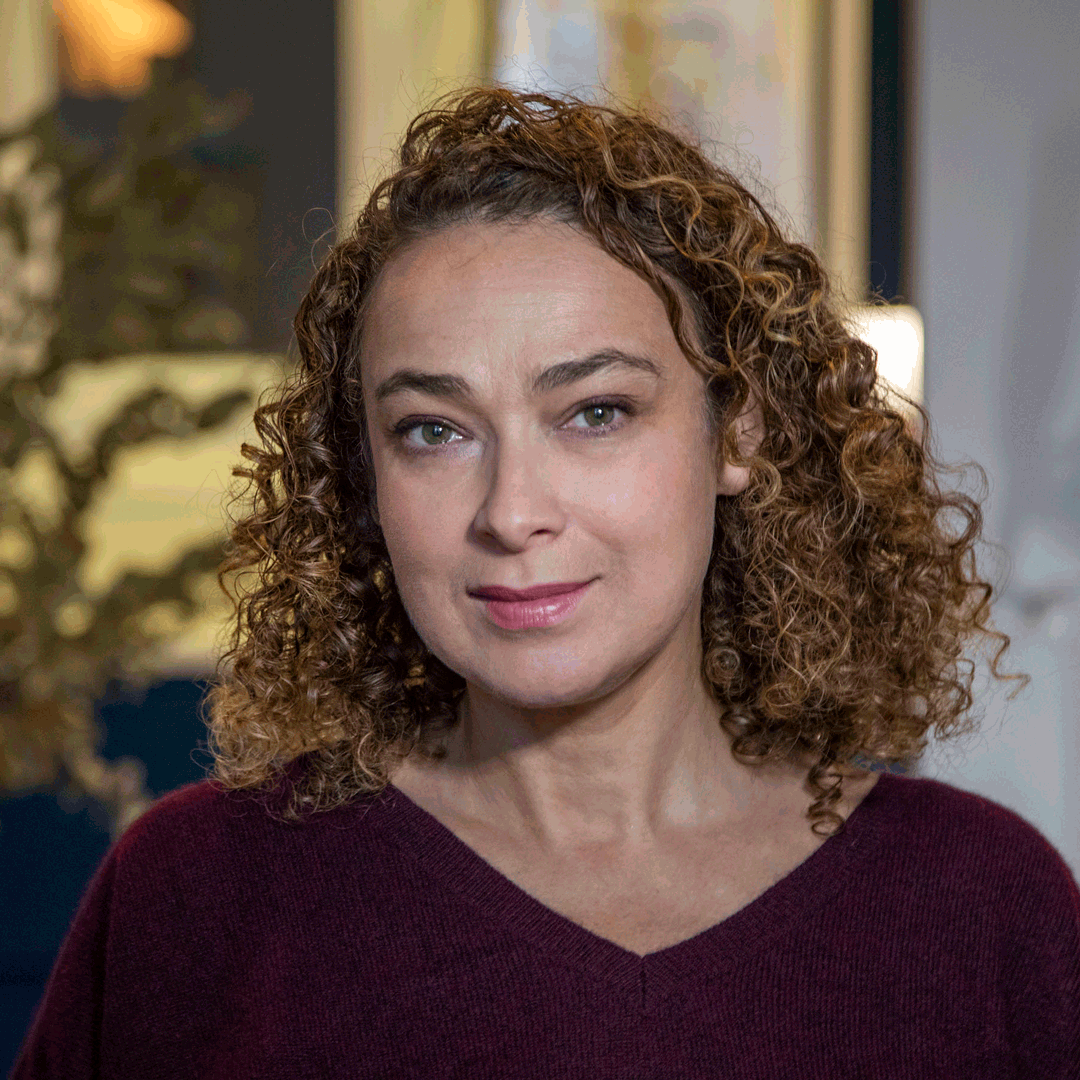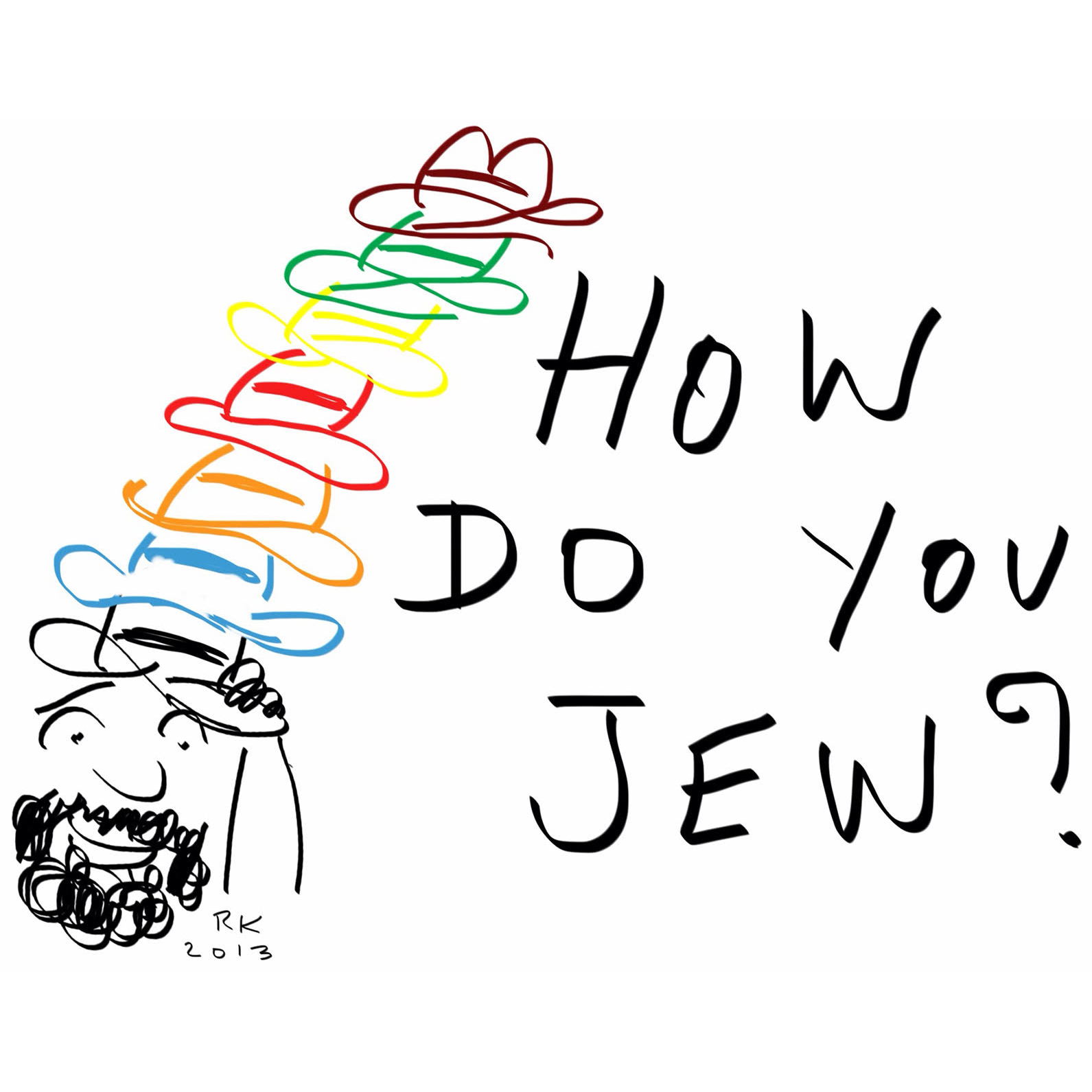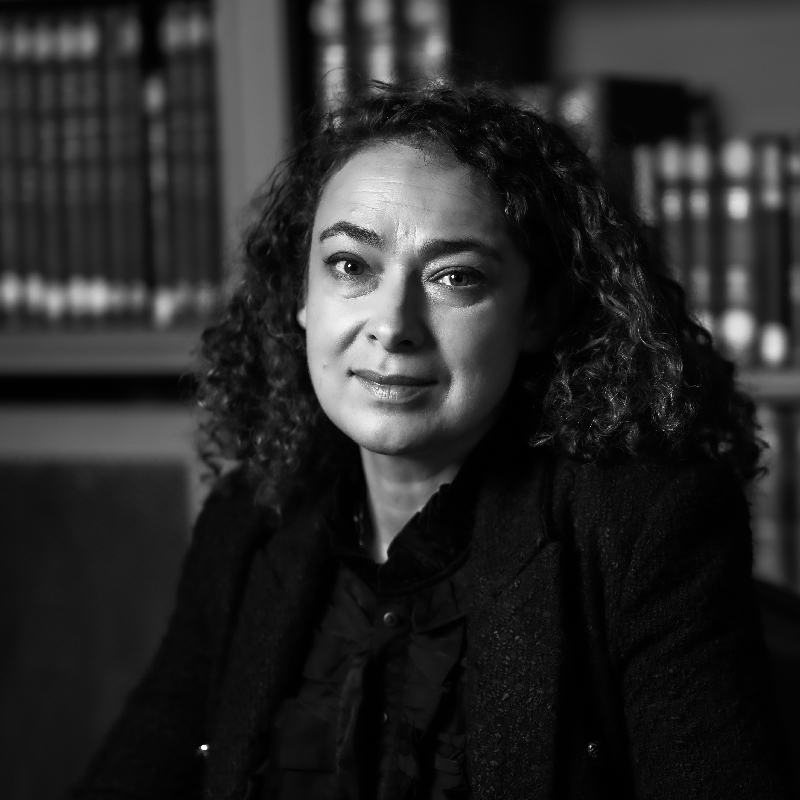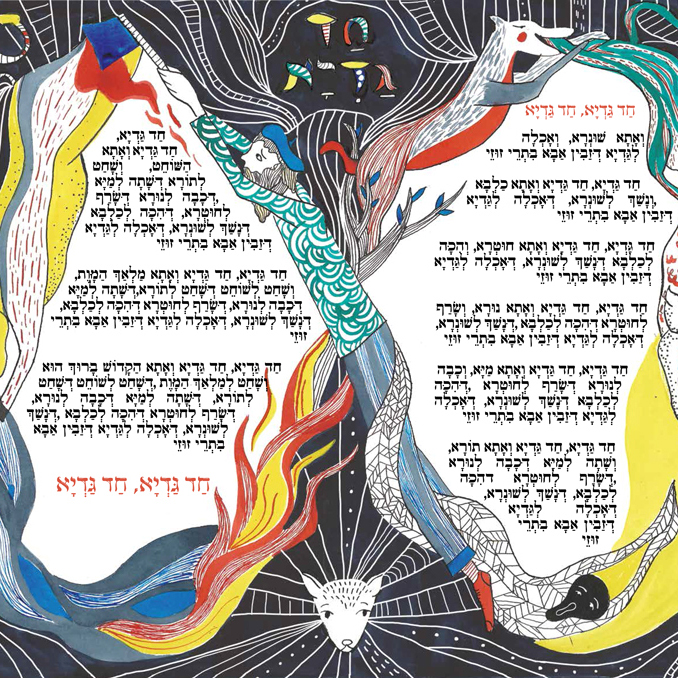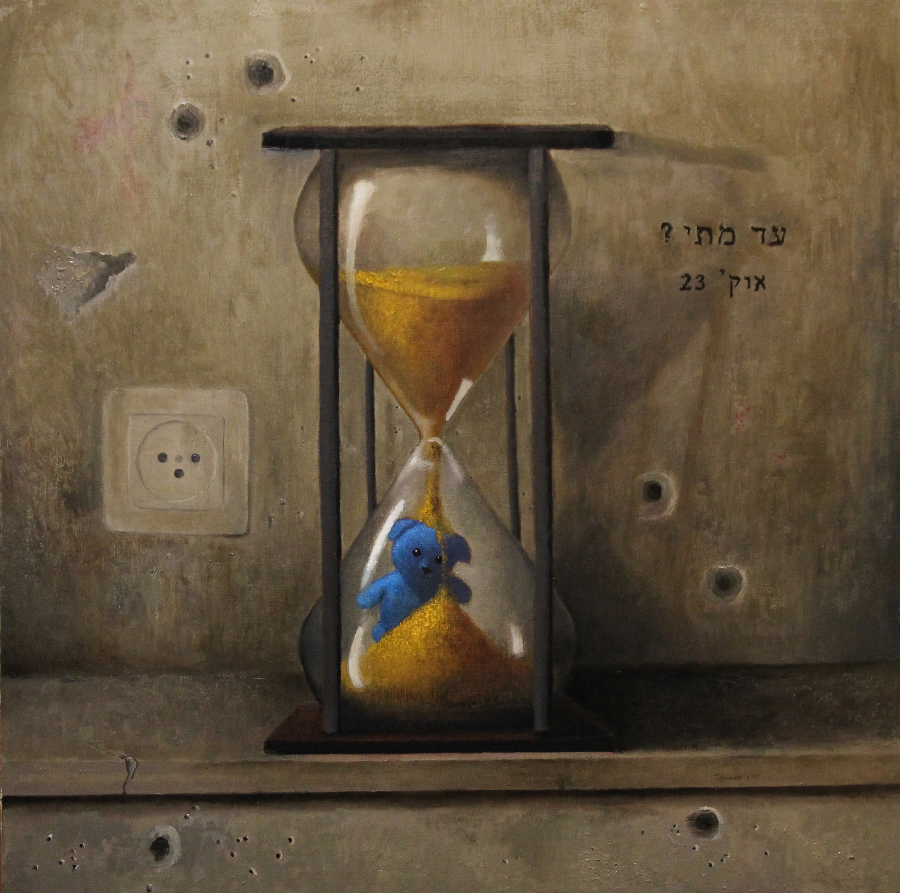
Lire ce texte en français / Read this text in French
As many of you already know, every year on the eve of Yom Kippur I like to begin with a joke.
Sometimes I spend weeks searching for one that feels just right for the moment we’re in. I wonder how I can help my community step into this solemn time with a touch of that ancient, sacred humor that has carried us through so many trials.
This year, I remembered a story I once read in a book by Romain Gary.
It’s the story of a Jew who, in the midst of a pogrom, is stabbed near the heart by a Cossack. His loved ones rush to his side and ask:
“Moishe, does it hurt?”
And Moishe answers: “Oh… only when I laugh.”
In just a few words, you have the most powerful distillation of what Jewish humor is, what it is for, and how it so often saves us : this ability our people have to hold tragedy at a distance, to try to keep a grip on what happens to us—or on what murders us.
This year, laughter itself feels like a strange challenge. We are living in a time so full of despair, so crowded with worries and fears. Rarely—if ever—have the Yamim Nora’im, the “Days of Awe,” so fully lived up to their name.
Around us there is a surge of hatred and an explosion of antisemitism, threats hanging over our children, and a fog of confusion that puts us in danger again and again. And then there are the immense pains echoing from the Middle East : the endless mourning, the hostages still held, all the innocents who suffer, the children of Gaza who are dying, the humanitarian crisis, a generation of young people sacrificed to war, the anguish of so many families, the devastation that overwhelms us….
And then there are the hatreds that tear us apart : the ones directed at us, and the ones that sometimes take root within us. Our inability to speak to one another, or to understand one another. The constant resort to insults, to vile language on social media, and also the tensions within our families or groups of friends.
And while we are gathered in our places of worship, on this evening when the Jewish people are meant to return to synagogues or family gatherings, there too it is difficult to find dialogue. In fact, this is precisely what I must speak to you about.
I know that here, even in our own communities, as in so many families I accompany, there are pains and tensions, words that cannot be spoken, crises that cannot be named. In these past weeks I have met so many people who have told me almost the same thing : “I’m no longer able to speak to my loved ones. I can no longer bear what my parents say, I no longer understand what my children think. I’m no longer able to speak to my spouse or to my cousin.”
This family crisis, this impossible conversation, even within the most intimate circles, has taken hold of us. I am certain that tonight in this room there are many people who know exactly what I mean—because they are living it.
The psalm may well say : הנה מה טוב ומה נעים שבת אחים גם יחד — “How good and how pleasant it is for brothers and sisters to dwell together in unity” — but are we truly able to live it ?
The first text is a classic of rabbinic debate (Tractate Eruvin). The scene takes place in the first century BCE, not far from Jerusalem—almost 2,000 years ago. Two sages lived there : one was named Hillel and the other Shammai, and the two of them were always quarreling.
Wherever Hillel’s students say “white,” Shammai’s say “black.” One side declares, “It’s permitted,” and the other insists, “It’s forbidden.” They agree on almost nothing. Then, in the course of a famous debate between them, each one claims that the halakha—the Jewish law—must follow his own view, and certainly not that of the other.
The situation is nothing unusual and could just as well be happening today : two opinions clash and polarize to the extreme—“I’m right, the other is wrong.”
Suddenly, a heavenly voice breaks into the debate and declares : “Both these and those are the words of the living God.” In other words, there is truth in what comes from the house of Hillel, and truth as well in the view of the house of Shammai. For, after all, truth can be spoken in many different ways.
“But…” the voice goes on—with no small measure of chutzpah, real nerve—“from now on, the law will follow the opinion of Hillel.”
At this point, the reader, puzzled, can’t help but wonder : why such injustice ? Why should Hillel come out on top in the debate if “his” truth is no truer than Shammai’s ? Why should he enjoy this privilege ?
The Talmud responds : because, unlike the students of Shammai, those of Hillel were able to cite their opponents’ arguments—with respect and humility—before stating their own.
This reveals the deeper moral of this Talmudic teaching. We may find ourselves in deep disagreement, but we must always listen to the other, to be able to put forward their point of view, to respect it deeply enough not to agree with it, but to present it before ever giving our own opinion.
This passage from the Talmud is a lesson in the ethics of speech, one that still speaks directly to us today. Can we really listen to the other’s argument without at once condemning them as a traitor, a coward, or a bastard ?
I can’t say.
For months now, whenever I think about this passage from the Talmud, another text immediately comes to mind, one that stands in tension with it. Here is the second text I want to share with you tonight, found in Tractate Gittin.
The scene unfolds in the first century CE, in the very same place—that is, exactly one hundred years after the text I just mentioned.
At this moment, in Jerusalem, the Romans laid siege. Jerusalem stood on the brink of falling, and soon the Temple was to be destroyed. But inside the walls, the Zealots had seized power—fanatical Jews, refusing any compromise and sure that God stood with them. They forbade any Jew from thinking otherwise or from running from the besieged city ; they silenced every voice of moderation and branded those who spoke them as traitors.
This is when a rabbi named Yohanan ben Zakkai came on the scene. Realizing he could no longer speak to his people—not even to his closest family members—and that the Zealots in power gave him no hope, he came up with a surprising strategy. He pretended to be dead, since only the dead could leave the walls of the Old City. Thus he escaped Jerusalem with a few of his students.
Once outside the wall, he stood before the Roman general, a man named Vespasian, and made this request : “Grant me the town of Yavneh and let me settle there with a few sages.” Yohanan ben Zakkai was about to set up a school in that nearby town, and that day he gave birth to rabbinic Judaism, of which we are the heirs.
The Temple was destroyed, but a Judaism of life—rooted in study instead of sacrifice—came to life. While keeping its eyes turned toward Jerusalem, Yavneh would carry continuity forward. And true to its name—Yavneh (יבנה), meaning “he will build”—it came to embody the possibility of rebuilding beyond catastrophe, the possibility not only to survive, but to have a future.
For months now, these two texts have been circling in my mind. A full century separates the first from the second. But in truth, a whole world lies between them.
The first teaches : Remember, in every circumstance, how to keep speaking with your own. Be willing to keep the conversation going, for the Law stands with the one who still hears the truth of his brother—even if he does not embrace it.
And the second teaches : There comes a time in history when dialogue is no longer possible. Perhaps because the Zealots have seized power, or because political violence leaves no room for a path of moderation. Then life depends on your ability to create something else, to reinvent in another place, to let go of an impossible dialogue, yet build a Yavneh—the place for another conversation.
As I set these two texts side by side, here before you tonight, I see that I am asking a question for which I hold no answer. This question comes down to a single phrase : What time is it ?
What time is it tonight ? Is it Hillel’s hour, or the time of ben Zakkai’s teaching ? Is it the time to hear the truth of the other, or the time to raise up a Yavneh beyond the walls ?
This question is grave, yet it has no answer. No one knows where we stand in history. And yet we cannot escape asking ourselves this painful question.
I know I’m not the only one who asks this question. This summer, I heard—maybe as you did—the renowned Israeli scholar Yuval Noah Harari, author, among other works, of the bestseller Sapiens, address it in almost the same way.
In an interview with Israeli journalists, he too recalled this episode from the life of Yohanan ben Zakkai. He said that, in his eyes, Judaism is facing today one of the greatest spiritual crises in its history, and he asked—echoing that Talmudic passage : Will we be hardline Zealots who refuse any compromise in the name of their truth ? Will we be builders of Yavneh, who shape another future ? Or will we be Romans, who know perfectly well how to master military power to defend themselves, yet who write another story for their people ?
Are we none of these, or somehow a little of all of them together ? Are we still Hillel’s children, who quarrel, yet still know how to hear the truth when it echoes in the other ?
My friends, what time is it ?
With this simple question we must enter into this solemn season—Yoma, the great day of Yom Kippur, in the words of the Talmud.
For 25 hours, we will engage in introspection. We will seek forgiveness—the forgiveness we seek, or the forgiveness others seek from us. We will lay bare and confess the transgressions committed before God, and before our fellow human beings. We will confront the violence we have endured, and the violence we may have inflicted. And side by side, we will ask what violence sometimes erupts within our own family, within our own community.
All is arranged during these Days of Awe. Not only today, but all throughout this whole solemn season. Consider the week that has just passed : just a few days ago, we observed a fast that is sadly little known. This solemn day always falls just before Yom Kippur, as a foretaste of the great forgiveness.
Tonight, I must also say a few words about it, because this little‐known day is closely linked to what I have just been speaking about.
This past Thursday, on the third day of Tishrei, was observed, as it is each year, the fast commemorating Gedaliah.
So who was this man ?
Gedaliah was a Jew, a man considered upright and worthy by the prophet Jeremiah, who lived near Jerusalem at the time of the destruction of the First Temple. After Judea fell to the Babylonians, most of the Jewish people went into exile, into the Diaspora. Yet a small remnant of Jews remained in Jerusalem. Nebuchadnezzar chose to install a Jewish governor—this very Gedaliah—to administer the Jewish population, the Judeans who had stayed behind.
But then, some fanatical Jews declared Gedaliah a traitor, saying that the compromise he was ready to strike with the nations turned him into an enemy of his own people. During the week of Rosh Hashanah, they conspired to kill him. Gedaliah was murdered.
The rabbis taught that this inner strife among the Jewish people—this division—was such a calamity that they decreed a perpetual fast day to commemorate it, so that we would never forget the ruin to which political violence and division can lead.
This week, on the Fast of Gedaliah, I went back to the passage in the book of Jeremiah where this scene is related. And it was there that I discovered that in chapter 40, verse 8, the name of Gedaliah’s murderer is revealed.
I was startled when I read this verse, for it is written : ויבאו אל גדליה המצפה, “Here are those who struck Gedaliah in the city of Mizpah,” and, among them, ישמעאל בן נתניהו, “Ishmael son of Netanyahu.”
The name “Netanyahu” appears in this episode of the Bible and—save for a Temple musician in King David’s time—in no other place, to my knowledge. Here, it is the name of the principle that begets division within the Jewish people.
I know—it’s strange and unsettling, and perhaps some of you might be asking : so what ? What are we to make of it ? Nothing at all ! There is absolutely nothing to conclude from it.
Of course, the Netanyahu of the Bible says nothing at all about the Netanyahu of today. There is no predestination, no inherent guilt of a person tied to his family name. We must, in fact, beware of those who believe that current events are foretold in the Bible, or that History itself has been prewritten there.
I believe simply that, at times, the text’s playful winks invite us to meditate on our present. In the Bible, the name “Netanyahu” has something to do with the division of the people, and with the political violence that is born of the inability to make room for the other.
Perhaps it is an invitation to think about the essential struggle against a fatalistic reading. To reflect, more than ever, together on what time it is. To remind ourselves that, whatever the hour, it is probably never too late.
Never too late to remember that nothing is yet written, and that everything can still change.
The Days of Awe continually remind us : the Book of Life lies wide open before us, and it may yet receive new, unwritten chapters of our story—all the words we might still share, and all the words we might yet choose to leave unsaid.
The hour has come for forgiveness. But Jewish forgiveness is never about agreeing with the other at any cost, nor about forgetting what has been said or done, but rather about trying to live with it, and searching for ways to take different paths in the future.
Nothing captures this better than Jewish humor, and its stubborn resolve to rise above, time and again, the tragedy that befalls us.
Let me conclude with the Jewish joke most fitting for these circumstances.
It is the story of Moishe and Shloime, who can’t stand each other and who, throughout the year, argue and quarrel, despise and torment one another.
As Yom Kippur draws near, they decide, at long last, to reconcile and forgive. Moishe turns to Shloime and says, “You know what ? Let’s call a truce. For this new year, may you have everything you wish for me.” And Shloime replies, “Ah, there you go again!!!”
May we be inscribed in the Book of Life, may we treasure life, and may we protect lives. May we learn once more to speak with one another, so that together we might genuinely strive to repair ourselves. Shanah Tovah.
Translation by Antoine Strobel-Dahan
